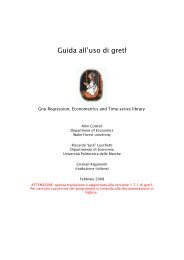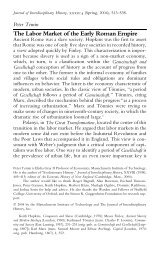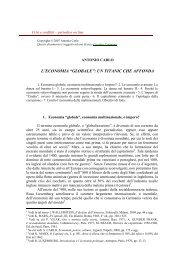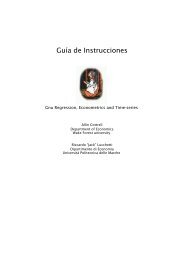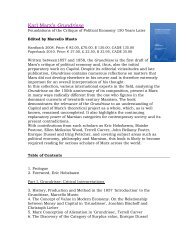How did Paul Krugman get it so Wrong? John H. Cochrane ...
How did Paul Krugman get it so Wrong? John H. Cochrane ...
How did Paul Krugman get it so Wrong? John H. Cochrane ...
You also want an ePaper? Increase the reach of your titles
YUMPU automatically turns print PDFs into web optimized ePapers that Google loves.
exactly the same.<br />
Second, <strong>Krugman</strong> argues that “a more or less Keynesian view is the only plausible<br />
game in town,” and “Keynesian economics remains the best framework we have for<br />
making sense of recessions and depressions.” One thing is pretty clear by now, that<br />
when economics incorporates flaws and frictions, the result will not be to rehabil<strong>it</strong>ate<br />
an 80-year-old book. As <strong>Paul</strong> bemoans, the “new Keynesians” who <strong>did</strong> just what he<br />
asks, putting Keynes inspired price-stickiness into logically coherent models, ended<br />
up w<strong>it</strong>h <strong>so</strong>mething that looked a lot more like monetarism. (Actually, though this<br />
is the consensus, my own work finds that new-Keynesian economics ended up w<strong>it</strong>h<br />
<strong>so</strong>mething much different and more radical than monetarism.) A science that moves<br />
forward almost never ends up back where <strong>it</strong> started. Einstein revises Newton, but<br />
does not send you back to Aristotle. At best you can play the fun game of hunting<br />
for inspirational quotes, but that doesn’t mean that you could have known the same<br />
thing by just reading Keynes once more.<br />
Third, and most surprising, is <strong>Krugman</strong>’s Ludd<strong>it</strong>e attack on mathematics; “economists<br />
as a group, mistook beauty, clad in impressive-looking mathematics, for truth.”<br />
Models are “gussied up w<strong>it</strong>h fancy equations.” I’m old enough to remember when<br />
<strong>Krugman</strong> was young, working out the interactions of game theory and increasing returns<br />
in international trade for which he won the Nobel Prize, and the old guard tuttutted<br />
“nice recreational mathematics, but not real-world at all.” He once wrote eloquently<br />
about how only math keeps your ideas straight in economics. <strong>How</strong> quickly<br />
time passes.<br />
Again, what is the alternative? Does <strong>Krugman</strong> really think we can make progress on<br />
his – and my – agenda for economic and financial research – understanding frictions,<br />
imperfect markets, complex human behavior, inst<strong>it</strong>utional rigid<strong>it</strong>ies – by reverting<br />
to a l<strong>it</strong>erary style of expos<strong>it</strong>ion, and abandoning the attempt to compare theories<br />
quant<strong>it</strong>atively against data? Against the worldwide tide of quantification in all fields<br />
of human endeavor (read “Moneyball”) is there any real hope that this will work in<br />
economics?<br />
No, the problem is that we don’t have enough math. Math in economics serves<br />
to keep the logic straight, to make sure that the “then” really does follow the “if,”<br />
which <strong>it</strong> <strong>so</strong> frequently does not if you just wr<strong>it</strong>e prose. The challenge is how hard<br />
<strong>it</strong> is to wr<strong>it</strong>e down explic<strong>it</strong> artificial economies w<strong>it</strong>h these ingredients, actually <strong>so</strong>lve<br />
them, in order to see what makes them tick. Frictions are just bloody hard w<strong>it</strong>h the<br />
mathematical tools we have now.<br />
The insults<br />
The level of per<strong>so</strong>nal attack in this article, and fudging of the facts to achieve <strong>it</strong>, is<br />
simply amazing.<br />
As one l<strong>it</strong>tle example (ok, I’m a b<strong>it</strong> sens<strong>it</strong>ive), take my quotation about carpenters in<br />
Nevada. I <strong>did</strong>n’t wr<strong>it</strong>e this. It’s a quote, taken out of context, from a bloomberg.com<br />
article, wr<strong>it</strong>ten by a reporter who I spent about 10 hours w<strong>it</strong>h patiently trying to<br />
7



